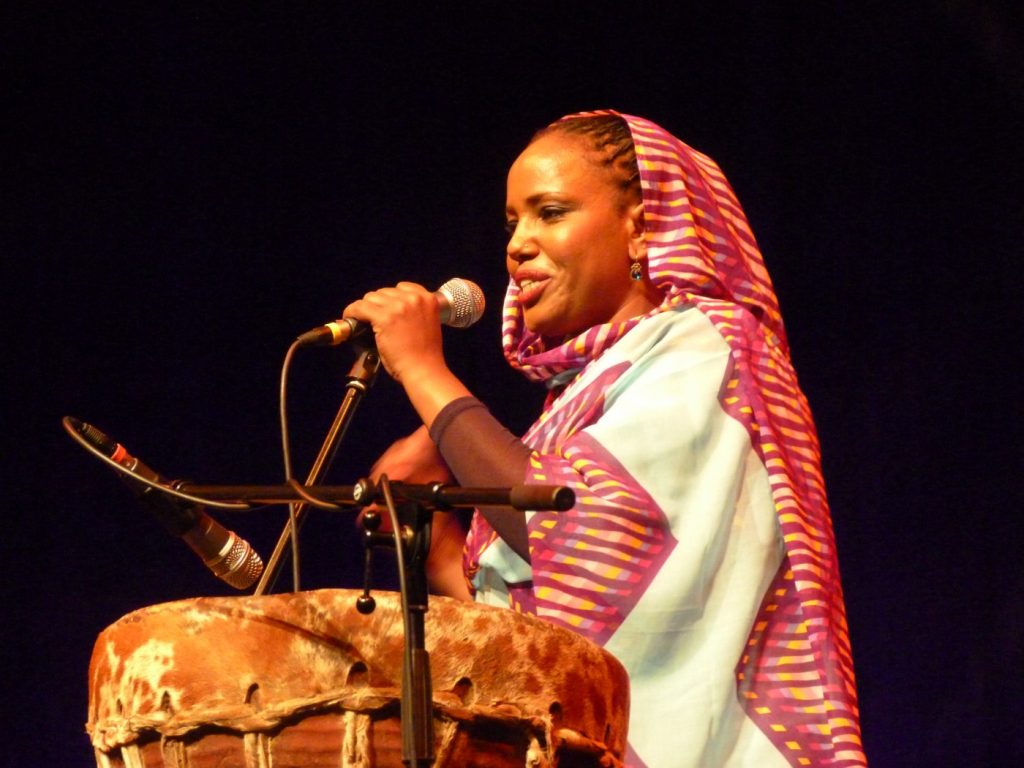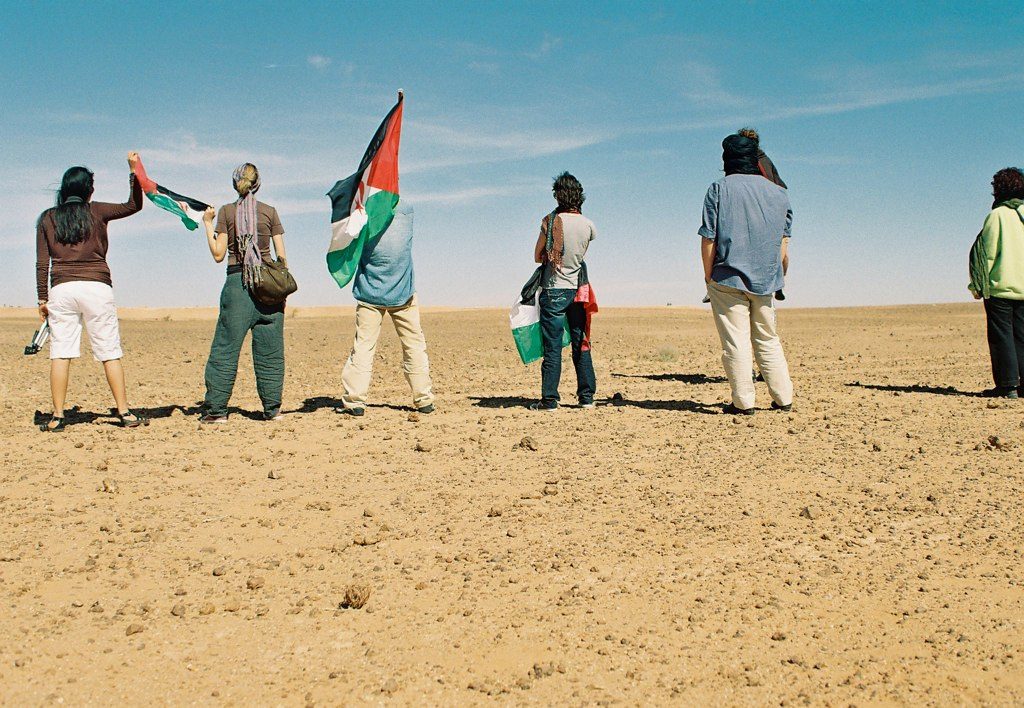Singer Aziza Brahim on the Sahrawi people, her music, and the refugee crisis

Credit: Elekes Andor
Another fleeting star was seen
Crossing the wall tonight,
Undetected by the radar,
Unnoticed by the guard.
On the land and the sea
The walls keep rising still
– from Los Muros (The Walls) by Aziza Brahim
Aziza Brahim is a singer and a poet. But first and foremost she is a Sahrawi—a proud citizen of a people whose homeland in Western Sahara has been under Moroccan occupation since 1979. Many Sahrawi’s remain in the occupied land, but around 90,000 live in refugee camps in the southern corner of Algeria, in an area known as ‘The Devil’s Garden’, where temperatures often reach 50 degrees Celsius. They have lived there for 42 years, separated from their homeland by the world’s 2nd longest wall—the Berm (a 2, 700km long sand wall)—and millions of landmines. This is where Aziza was born and raised.
Her music is rooted in the places she has lived—West Africa, Cuba, and Spain. Her lyrics represent the struggles of her exiled people, evocatively describing their history, battles, hopes, and the surrounding desert landscape. She is at once a musician and an activist. “I’m not able to separate politics, cultural and personal concerns,” she said in 2015, “the focus of my music is all of these areas at the same time”. Her most recent album, Abbar El Hamada (Across the Hamada desert), was released on Glitterbeat in 2015, and quickly rose to no. 1 on the world music charts.
I met her before her performance at Leeds’s Howard Assembly Rooms.
Your grandmother was a poet and your mother was a singer, what did they teach you when you were growing up?
My grandmother taught me many values about the fight and the struggle. Of course she was the one who always motivated me to sing, and taught me about the power of culture, music, and poetry.
Can you explain who the Sahrawi people are and describe their political situation?
My people, the Sahrawi people, according to the UN, live in ‘the last colony of Africa’. It is the last territory of Africa to be decolonised. We were a Spanish colony until 1975, until Morroco occupied Western Sahara. That occupation was always resisted by Sahrawis. In fact, in 1973, the people went to the Hague, to the International Court of Justice. In 1973, it was determined that Western Sahara did not have any links, either historical or cultural, with Morocco, and that therefore it is sovereign territory. At the time, Spain was going through a difficult transition after Franco had died, and the administration of Western Sahara was given to Morocco and Mauritania under the three-party agreement of 1975.
Since then Morocco has occupied the territory. It entered by force. Lots of people had to escape to the south of Algeria to settle in the refugee camps where, until now, they have lived. There are almost 295,000 Sahrawi refugees in Algeria. They keep resisting. Part of our population remains in the occupied territories of Western Sahara, under the occupation of Morocco. In 1991, the UN intervened to stop the war that had lasted many years (26), to try and achieve a self-determination referendum so that Sahrawi’s could vote for their independence. Since then Morocco has been obstructing the peace process. We have never had the vote. We have already been refugees for 42 years.

A view of the Berm. Credit: Michele Benericetti
What is the role of women in Sahrawi community?
In the Sahrawi community the woman has always held a very important role. My people were driven into the desert, and so the Sahrawi state, and everything in the refugee camps, was organised and built by women. All men were at the front fighting. In the camp there are only women and children. Woman have built the hospitals, the schools, they have organised the camps. The Sahrawi women are the spine of the resistance of the Sahrawi people.
As a musician, how do you see as your role in the struggle of your people?
Music is part of our resistance and our identity as people. Culture, in Sahrawi society is very important, because we were nomads. In the past, the culture has always been transmitted orally, and was never documented. Moreover, nowadays the music is a very important focus for the conflict, it makes visible the suffering of thousands of Sahrawis. Almost four generations of Sahrawis who have been born in the refugee camps.
For me, the music has been a source of escape from the camps. I loved singing when I was little. When I was little singing was like a game for me, it was my escape, it was natural. I sang in my town and with my family on Fridays when they met with the neighbours to play the Tabal and sing spiritual songs. Music gives me freedom, it is something that no one can take away from me. It gives me a right to speak, to present and expose my viewpoint. Also, music gives us the power to be close to the people who suffer the same as us, who suffer the injustices that are happening today in the world. So it is almost like a cure.
Do you see yourself as having a political role?
It gives me great satisfaction to be able to bring the concerns and hopes of Sahrawi people to the world. For me and for the majority of humanity, music is a mode of expression and that is especially important to a people who have basically nothing. Because if you are a Sahrawi you know that someone has taken your homeland from you, and you know that over the years they have taken everything from you. It is as if you do not exist. For us music reminds the world that we exist. I feel obligated to tell my story because I was born and raised in the refugee camps. But I also need to tell the stories that were told to me by my mother, grandmother, my uncles and by the Sahrawi people. I do feel obliged to tell of this history and the story of my people, it is almost a necessity for me to talk about them. Think about it: in the arena of geopolitics, our people do not exist, our country does not exist! We are merely a commercial number. But for us, our country and our land exists in our dreams, in our memories, in our wishes, in our thoughts. Most of my music is dedicated to my people. It is a very important task for me.
As a Sahrawi living in Barcelona, how do you view the reaction of Europe to the arrival of refugees?
Although I live in Barcelona nowadays, I never forget my people or my family. All of my family nowadays are in the refugee camps. I cannot forget. Regarding the treatment that has been given to refugees I personally think that it is embarrassing. When I saw thousands and thousands of people with children, old people, disabled, in wheelchairs and young people, crossing the Mediterranean… The Mediterranean is a mass grave of human beings, while Europe and the rest of the world watch as if it has nothing to do with them. It is an embarrassment for humanity, and it makes me remember the Long Journey experienced by my people when they were driven to cross the deserts for weeks and weeks to reach the south of Algeria.
Back then the problem of the refugees was not visible. Nowadays it is visible because the refugees are arriving at the doors of Europe. The Europe that many of us dreamt of. They see Europe as an escape from all of the misfortunes of their home countries, and Europe does not have the minimum amount of empathy. I don’t mean ‘Europe’ as a society, but the European politicians. Normal people have urged their governments to act but their governments have looked elsewhere. And we know that the majority of these conflicts were created by the big powers that caused people to flee from their homes. I don’t think that an effective solution has been researched, or that the suffering of all of these people has really been acknowledged. Even yesterday we saw that there are refugees dying of cold. It is only shown in the news to shock people, but real solutions are not being examined. That makes me embarrassed, and it disappoints me.
Buy Abbar el Hamada here and read more about the Sahrawis here. The organisation Wall of Sand raise awareness of the Sahrawi situation and this film features Aziza’s grandmother, the famous poetess Al-Khadra, as part of Al-Jazeera’s Poets of Protest series.
With thanks to Paulette Dougnac Quintana for the translation.

Comments